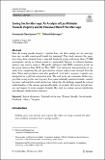Saving sex for marriage : an analysis of lay attitudes towards virginity and its perceived benefit for marriage
Abstract
How do young people interpret virginity loss, and does saving sex for marriage have any socially constructed benefit for marriage? This study answers this question using data obtained from a peer-led Facebook group with more than 175,000 participants, mostly in African countries, particularly Nigeria. A reflexive thematic analysis was used to analyze 100 public wall posts and 3860 comments posted on the group between June 2018 and May 2019. Four distinctive interpretations of virginity loss comprising the gift, precondition, stigma, and process emerged from the data. These interpretations were also gendered, such that a woman’s virginity was interpreted as a gift but a stigma for men. The wall posts and comments further suggest that saving sex for marriage may have some culturally sensitive benefits, including trust, and marital sexual satisfaction. Altogether the findings expand the current understanding of the diverse perceived benefits of virginity that move beyond honour and respect to more complex benefits like trust in a union, sexual satisfaction and ultimate satisfaction in marriage.
Citation
Olamijuwon , E & Odimegwu , C 2021 , ' Saving sex for marriage : an analysis of lay attitudes towards virginity and its perceived benefit for marriage ' , Sexuality & Culture , vol. First Online . https://doi.org/10.1007/s12119-021-09909-7
Publication
Sexuality & Culture
Status
Peer reviewed
ISSN
1095-5143Type
Journal article
Description
EO acknowledges funding support from the Southern Africa Systems Analysis Centre, National Research Foundation, South Africa, grant number: 118772, and the Faculty of Humanities, University of the Witwatersrand, Johannesburg, South Africa.Collections
Items in the St Andrews Research Repository are protected by copyright, with all rights reserved, unless otherwise indicated.

